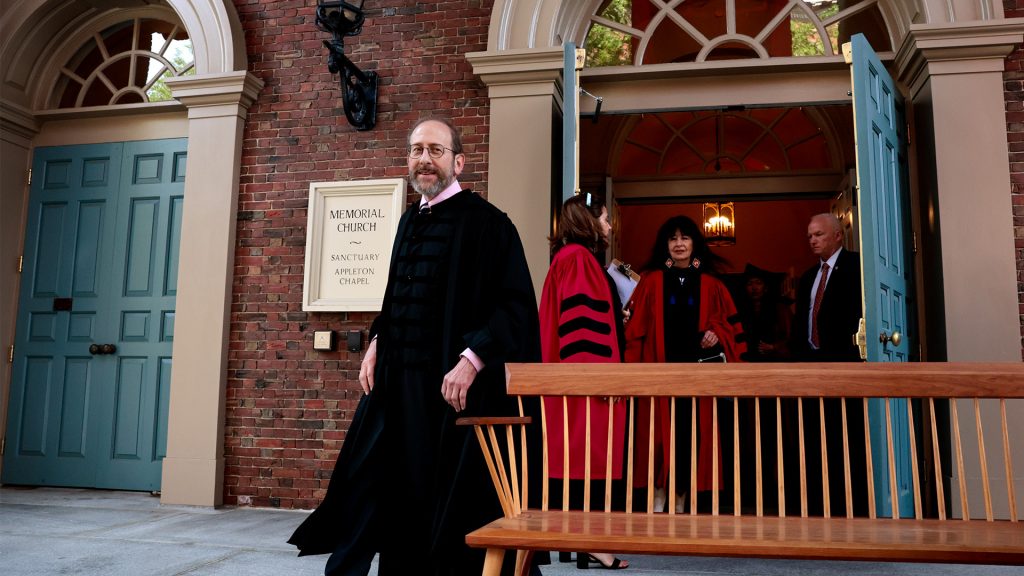Harvard president takes 25% salary cut amid federal funding freeze

Harvard President Alan Garber will voluntarily take a 25% salary reduction for the 2026 fiscal year, a move the university said is part of its response to the Trump administration’s sweeping freeze on federal funding. The cut, which begins July 1, 2025, was confirmed by several news outlets citing a university spokesperson.
Garber’s current salary was not disclosed, but previous Harvard presidents have earned around $1 million annually, according to previous reporting by the student newspaper, The Harvard Crimson.
Salary cut follows federal agencies pulling funding
In a lawsuit filed April 21, Harvard accused the administration of freezing $2.2 billion in multiyear grants and canceling an additional $60 million in contracts as unconstitutional. According to the lawsuit, letters of termination came from seven different federal agencies, including the National Institutes of Health and the Department of Defense. Each letter cited that the grants “no longer effectuate agency priorities.”
The Wall Street Journal reports that another $1 billion worth of federal funds for the university could be cut.
The Trump administration’s actions followed months of tension with elite universities over issues including campus speech, antisemitism, curriculum disagreements and policies involving diversity, equity and inclusion (DEI).
Harvard claims ‘blacklisting’ violates academic freedom
Harvard’s amended complaint said the funding freeze amounts to a “blacklist,” and alleged the government is retaliating against the university for refusing to meet certain political demands. These include changes to school governance and a “viewpoint diversity” audit of students and faculty.
The administration’s Joint Task Force to Combat Anti-Semitism also announced a halt to an additional $450 million in grants, accusing Harvard of allowing discrimination on campus, particularly antisemitism and racial bias in the Harvard Law Review. The task force did not specify which grants would be impacted.
In its filing, Harvard argued that halting research funding does not address concerns about campus discrimination.
“The government has not identified — and cannot identify — any rational connection between antisemitism concerns and the medical, scientific, technological, and other research it has frozen or terminated,” Harvard said.
Harvard pulls from its endowment
Harvard’s $53.2 billion endowment is the largest in the nation. The university is temporarily covering the gap in funding from its own resources, but said that approach isn’t sustainable.
“If Harvard continues to replace the frozen and terminated funding from its own resources,” the lawsuit states. “It will be forced to reduce the number of graduate students it admits and the number of faculty and research staff it pays to conduct research.”
The filing also said the university would struggle to maintain cutting-edge equipment and facilities without federal support. Harvard paused faculty and staff hiring in March, citing the need to assess how changes in federal policy might affect the university. That hiring freeze was implemented before the funding cuts were publicly announced.
Legal fight heads to court in July
Federal Judge Allison D. Burroughs has scheduled oral arguments in the case for July. Because Harvard has not requested an immediate injunction, the funding freeze will likely remain in place over the next several months.
Harvard’s legal argument rests heavily on academic freedom protections.
“No government — regardless of which party is in power — should dictate what private universities can teach, whom they can admit and hire, and which areas of study and inquiry they can pursue,” Garber said in a media statement in April.
Meanwhile, the Trump administration and federal agencies have argued they have a right to withdraw federal funding where they see fit.
“As we have made clear time and again, this Task Force will not waver in its mission to root out discrimination, hate and bigotry at institutions entrusted with public funds,” the Joint Task Force to Combat Anti-Semitism said in a statement. “Harvard, and its leadership group who are tainted by the egregious infractions under its watch, faces a steep, uphill battle to reclaim its legacy as a lawful institution and center of academic excellence.”
While both sides have acknowledged the possibility of negotiation, no resolution has been reached. For now, the nation’s oldest university remains in a standoff with the federal government.





